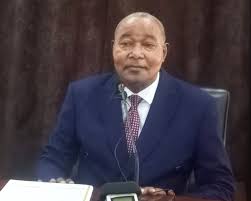The Dictator Sassou Nguesso is Hinting at Yet Another Constitutional Change
Denis Sassou Nguesso, the long-standing president of the Republic of Congo, is once again signaling potential changes to the country’s constitution. While the proposed adjustments may appear logical on the surface, it is widely speculated that these moves are simply a guise for introducing further measures that benefit the ruling clan and its interests, rather than serving the country at large.

On January 25, 2025, in a press briefing held in Brazzaville, Dominique Basseyla, the delegate minister and ad hoc commissioner for monitoring the 2015 national dialogue, presented a set of proposals aimed at reorganizing the Congolese political landscape. Basseyla’s ideas suggest a significant reshaping of the country’s political structure, hinting at a potential overhaul of the 2015 constitution.
Among the key proposals outlined by Basseyla are the creation of three political party blocs, the establishment of a vice-presidency, and reforms to the electoral system, particularly the election of deputies, senators, and local councilors.
Proposals for a Political Bloc System and the Vice-Presidency
One of the most notable recommendations is the creation of three political party blocs: the bloc of republican parties, the bloc of democratic parties, and the bloc of central parties. This is seen as a response to the fragmented nature of Congo’s political landscape, which currently boasts around sixty political parties for a population of just six million. Basseyla argues that this fragmentation breeds frustrations and potential conflict, especially during elections. Under the proposed system, each political bloc would present a candidate for the presidency, and independent candidacies would be eliminated.
Further changes include the introduction of a vice-presidency. Basseyla presented two options for the role: either the president-elect would appoint a vice president from their political bloc, or the vice presidency would be filled by the president’s running mate, elected alongside the president.
Reforms to the Electoral System and Political Representation
Another significant proposal is the reform of the legislative system. Basseyla reaffirmed the establishment of a proportional representation system for legislative elections, where the list system would be used to elect deputies. Under this system, when a deputy’s seat becomes vacant, the next candidate on the list would automatically fill the vacancy. Additionally, he suggested that legislative elections should be held in a single round to streamline the process and avoid prolonged election periods. This would likely result in the dominance of the three proposed political blocs in all institutions, eliminating the need for a leader of the opposition.
A Veiled Power Grab for the Sassou Clan
While Basseyla’s proposals may appear reasonable from a purely technical perspective, many critics view them as part of a larger political maneuver by President Sassou Nguesso to consolidate power further. The elimination of independent candidacies and the introduction of a vice-presidency that could be controlled by the president’s bloc are seen as potential means of securing the interests of Sassou’s family and inner circle. These changes may not be in the best interest of the Congolese people but rather designed to perpetuate the Sassou clan’s political and economic dominance.
Though Basseyla insists that a “profound institutional reorganization” is necessary, there is growing suspicion that these reforms are a pretext for introducing changes that will cement the ruling regime’s grip on power, making it even harder for any opposition to challenge Sassou’s rule.
The proposed reforms are expected to be discussed in an upcoming political consultation, which will bring together political and civil society actors. However, given the history of political manipulation in Congo, many are skeptical about the true intentions behind these suggestions and whether they will ultimately lead to a fairer, more democratic political system or serve as another tool for Sassou Nguesso and his family to entrench their hold on power.